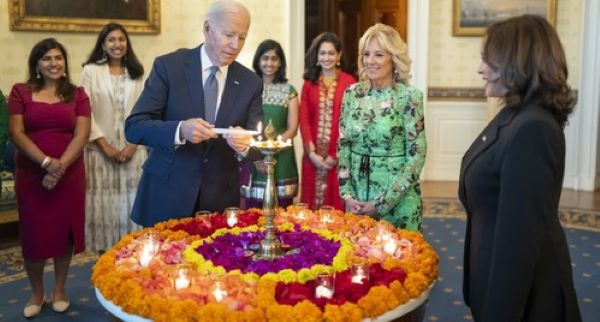By Meenakshi Iyer
The rapid rise of Indian Americans from politics to administration, entrepreneurship to technology, medicine to hospitality, science to academia has put the global spotlight like never before on the high-achieving four million-plus strong diaspora.
The community happens to be the most educated with the highest median income in the US, with an average household earning of $123,700 — making them the top earners in the US among other Asians in the country.
As the profile of the Indian American community — now the second-largest immigrant group in the US — has grown, so too has its economic, political, and social influence, according to a recent Carnegie Endowment study.
In 2010, only 18 per cent of Americans saw India as “very important” to the United States, according to The Chicago Council survey.
Now, India is perceived by Americans as their seventh favourite nation in the world, with 70 per cent of people viewing India favourably in 2023, says a Gallup survey.
Much of how America views India today can be attributed to the success of this community, which according to Prime Minister Narendra Modi, has played a significant role in the all-round development of the nation they live in and also strengthened the India-US relationship.
The fifth largest economy of the world, India today is seen in the US as a strong bilateral partner sharing common democratic values with broad-based and multi-sectoral cooperation in sectors like trade and investment, defence and security, education, science and technology, cyber security, etc.
American businesses heavily rely on highly-skilled workers from India to fill the gaps in IT and engineering sectors via the H-1B visa programme. These visa holders create prospects for US citizens, by enabling companies to invest in domestic operations instead of sending jobs abroad.
As US Ambassador Eric Garcetti recently said: “India is a place where dreams become reality every day. Our counties have so much in common. Indian dreams and American dreams are two sides of the same coin.”
Addressing the 2019 Pravasi Bharatiya Divas, then Foreign Minister late Sushma Swaraj had noted that while the Indian diaspora started migrating centuries ago, it was the migration of the educated, highly-skilled and dynamic young Indians that brought laurels to India.
The dominance of Sundar Pichai, Satya Nadella, and Parag Agarwal in the IT sector has strengthened the image of India in the US as a technology powerhouse and a source of quality human resources.
With US Vice President Kamala Harris sitting atop the political ladder, the US House of Representatives has five Indian Americans — Ami Bera, Ro Khanna, Raja Krishnamoorthi, Pramila Jayapal and Shri Thanedar.
There are close to 60 Indian-American CEOs in Fortune 500. Even though Indians are just 1 per cent of the American population, they are more than 10 per cent of the Fortune 500 CEOs with the likes of Laxman Narasimhan (Starbucks) and Raj Subramaniam (FedEx).
The US now has 20,000 Indian-American professors and at least a third of companies in the Silicon Valley that come for funding, and have an Indian American co-founder, according to Indiaspora founder M.R. Rangaswami.
According to foreign policy experts, it is the success of this community, which has dramatically changed the US perception of Indians and India, with its ability to spread Indian soft power, lobby for India’s national interests, and contribute economically to their mother country’s rise.
As part of “soft diplomacy”, Indian-Americans played a pivotal role in the fructification of the historic Indo-US nuclear deal in 2005.
The community also urged the political establishment — right from the Oval Office down to statehouses — to send aid worth at least half-a-billion dollars to India during the second wave of the Covid-19 pandemic.





